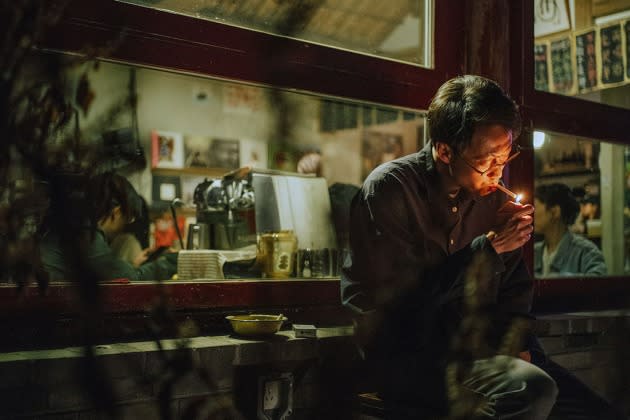‘The Shadowless Tower’ (‘Bai Ta Zhi Guang’) Review: A Divorced Food Critic Reconsiders His Existence in Affecting Minor-Key Drama
- Oops!Something went wrong.Please try again later.
- Oops!Something went wrong.Please try again later.
- Oops!Something went wrong.Please try again later.

The central characters in The Shadowless Tower are orphaned, disconnected, separated from the roots that give them an emotional and spiritual mooring. The loss of his elderly mother prompts a divorced, middle-aged food critic to seek out the father from whom he’s been estranged since childhood, shaking him out of his torpor and causing him to re-examine his relationships. Chinese writer-director Zhang Lu’s minor-key drama will be too muted and elusive to break beyond festivals, but its melancholy spell stays with you.
The structure that gives the film its oblique title is the Yuan Dynasty White Pagoda, soaring high above Beijing’s Xicheng district but believed to cast a shadow only on the faraway Tibetan planes. Perhaps because he feels simultaneously stuck and adrift in a life going nowhere since his divorce two years earlier, former poet Gu Wentong (Xin Baiqing) regards this prominent architectural feature of the place where he grew up as an anchor in a life that provides few of them.
More from The Hollywood Reporter
Berlin: StudioCanal Takes Mike Leigh's Untitled Next Feature for U.K.
Berlin Flashback: Golshifteh Farahani Debuted at the Fest in 'About Elly'
Berlin: Sean Penn Makes Plea for Greater Arms Support for Ukraine
With his ex-wife’s consent, Wentong has sent the bright 6-year-old daughter he adores to live with his older sister and her husband. When they visit the cemetery together, Wentung wonders who placed the fresh flowers on his mother’s grave. His brother-in-law drops the hint that it was his father, Gu Yunlai (Tian Zhuangzhuang), who was cut loose from the family in disgrace when Wentong was five. Yunlai has spent the decades since living alone in the coastal town of Beidaihe.
Wentong seemingly hasn’t thought much about his father in years, even if the absence of that parental figure left a hole in his life. He’s surprised to learn that Yunlai rides the 300 kilometers to Beijing twice a year on a bicycle just to observe his two children on their birthdays, and when Wentong’s brother-in-law stuffs a piece of paper with a phone number in his hand, he slowly comes around to the idea of making contact.
Meanwhile, Wentong falls into a tentative relationship with Ouyang Wenhui (Huang Yao), a flirtatious photographer in her mid-20s who shoots pictures of restaurant dishes to run with his articles. She takes the initiative in their slow-starter romance, booking them into a hotel that looks onto the White Pagoda. But his excessive politeness, and perhaps what she imagines is a resemblance to the father she never knew, keep stalling any physical expression of the feeling between them.
When Wentong learns that Wenhui comes from Beidaihe, he proposes they visit the beach town together, only gradually sharing the fact that his father lives there and revealing the unpleasant circumstances that caused his mother to end the marriage. Wenhui also shares details about her background that provide insight into her attraction to Wentong.
The director drops in a casual nod to Lee Chang-dong’s Burning early on, and while the two films have little in common, there are perhaps vague echoes here of the Korean drama’s investigation into loneliness, inertia and the mysteries of human connection.
That’s especially true of lovely scenes in which Wentong does travel to Beidaihe, watching from a distance as his father cycles to the beach to fly a kite, or entering the old man’s apartment while he’s out, and making no effort to hide his traces. Rather than feel threatened by signs that someone has been in his home, Yunlai appears to know instinctively that his son has paid him a visit, finding indirect ways to encourage him. Casting the expressive Tian — director of such gorgeous modern Chinese classics as The Blue Kite and Springtime in a Small Town — as the exiled father was a nice touch.
Ultimately, it takes Wenhui’s assertiveness to create a bridge between father and son, yielding a confrontation that may not be a reconciliation but perhaps opens the door to one in the future.
Without ever guaranteeing that Wentong will break completely from the passivity that has had him in emotional retreat, a number of sensitive encounters suggest his willingness to reconnect with the world in a more vital way. Those include poignant scenes with a depressed tenant in the apartment building of his mother, where Wentong has lived since his divorce; a reflective moment with his flinty sister; and a tender visit to his ex-wife in hospital.
Not a lot happens in The Shadowless Tower, and at almost two-and-a-half hours, it’s unhurried to a fault. But as DP Piao Songri’s loose, fluid camerawork trails the protagonist, played with soulful intelligence by Xin, there’s both a haunting sense of all that he’s lost and a newfound self-knowledge that perhaps might propel him forward with greater openness.
